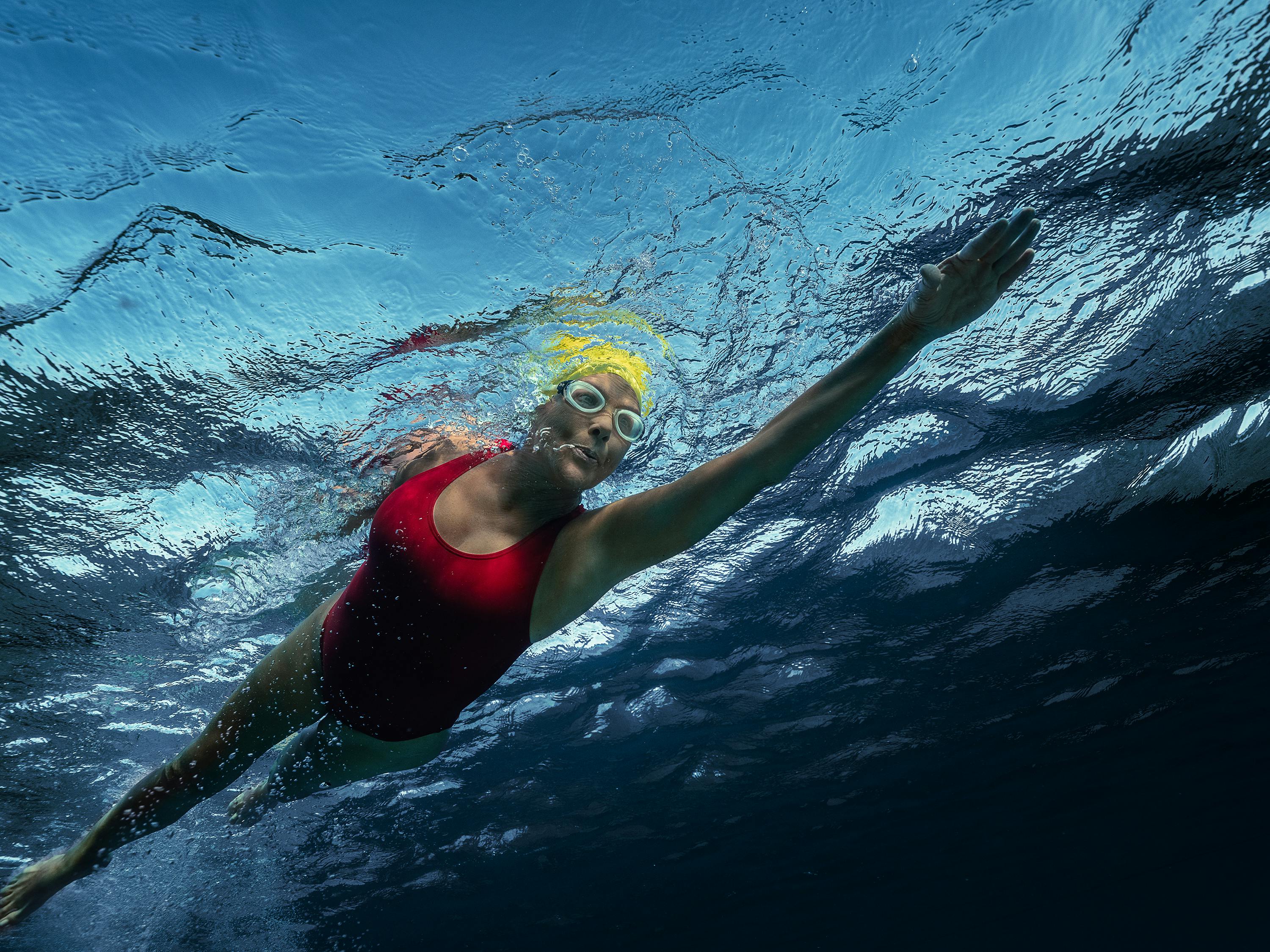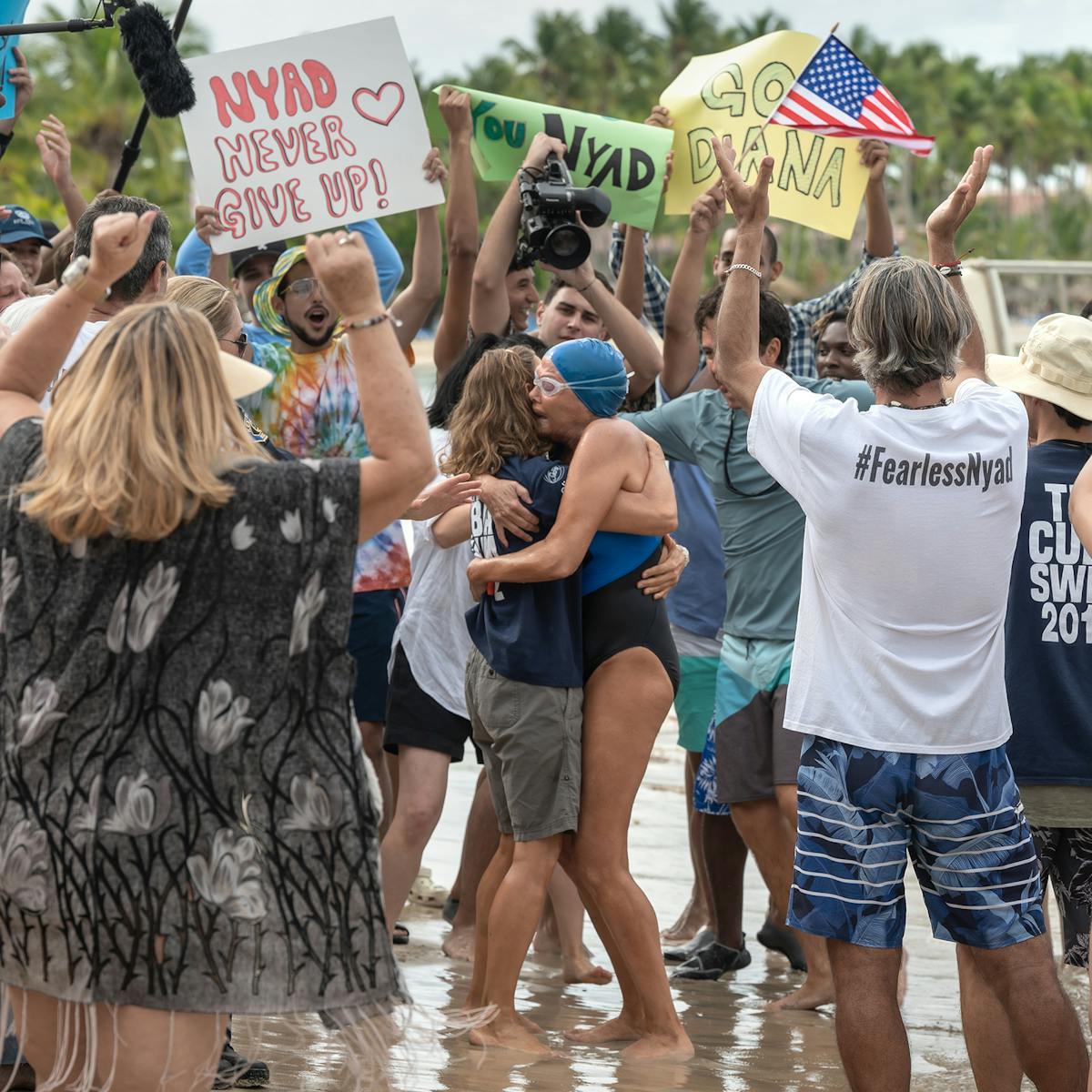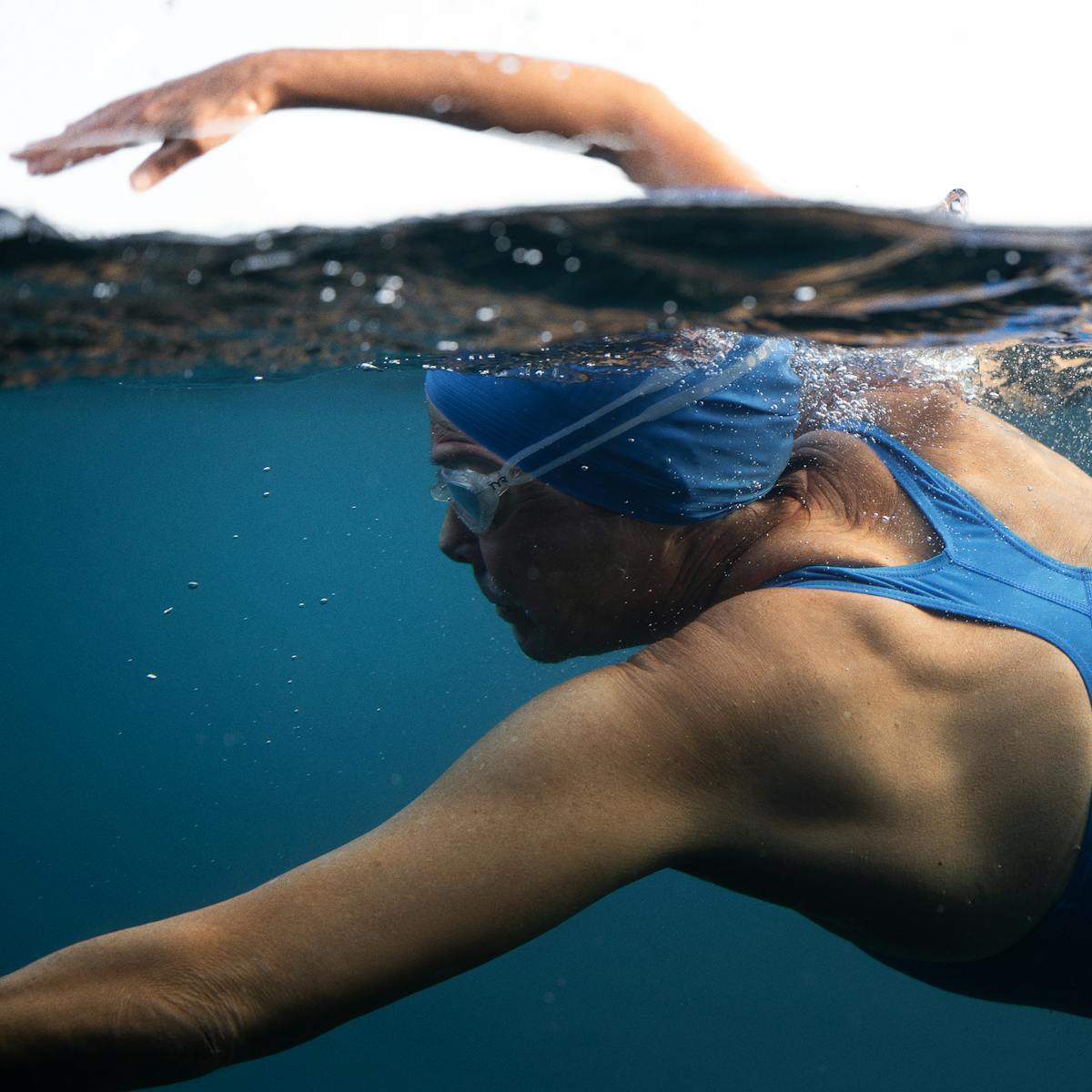As Annette Bening receives Telluride Film Festival’s Golden Medallion Tribute award, she and NYAD co-star Jodie Foster reflect on Bening’s extraordinary career.
Annette Bening’s inspirational drama, NYAD, centers the sports journalist, author, and motivational speaker Diana Nyad, who made a triumphant return to competitive long-distance swimming in her 60s after decades away. “I don’t believe in imposed limitations,” announces Bening’s Nyad at one point in the film. Neither, it would seem, does Bening. Over the course of her decades-long career, the four-time Oscar nominee has displayed not only tremendous range and skill, but also a tenacity and fearlessness in approaching roles in such highly acclaimed films as The Grifters, Bugsy, American Beauty, Being Julia, The Kids Are All Right, and 20th Century Women.
NYAD was no exception. Upon first reading the script, adapted by Julia Cox from the athlete’s memoir Find a Way, Bening immediately agreed to portray the swimmer, diving in without stopping to think of the physical demands that accompanied the role. “I loved the movie,” she says. “I loved the part. I knew I had to do it, but then I had to figure out how to actually do it.”
Unsurprisingly, she found a way, training for more than a year to inhabit Nyad onscreen as she sets out on her personal quest to swim the 110 miles from Cuba to Florida at an age when most people are ready to retire. Bening’s commitment impressed both directors Elizabeth Chai Vasarhelyi and Jimmy Chin (Free Solo), as well as her screen partner, Oscar-winning actor Jodie Foster, who plays Diana’s best friend Bonnie Stoll, the former racquetball star who becomes Nyad’s coach and steadfast confidante.
For Bening, giving everything she could to her performance was the only way to do justice to one exceptional woman’s real-life experiences. “I felt for Diana because we were going to be taking her story and putting it up there, and she went through a lot,” Bening says. “So the fact that Diana opened herself up to me the way she did, it’s the best part of acting, quite frankly. Doing the thing is great, and getting to do it with someone like [Jodie] is great, but learning about other people and really getting inside them and being very moved by Diana and her inner world, as well as what she’s achieved, [that was the best part].”
Bening and Foster took the stage together at Netflix’s Tudum Theater in Los Angeles to discuss their NYAD partnership, as Bening received the Telluride Film Festival’s Golden Medallion Tribute award in honor of her extraordinary body of work, as part of a special ceremony. Telluride Film Festival executive director Julie Huntsinger kicked off the event as Bening’s The Women co-star Meg Ryan presented the award, which recognizes an artist’s significant contribution to the world of cinema, in front of a packed house that included Nyad and Stoll as well as the film’s co-director Elizabeth Chai Vasarhelyi and screenwriter Julia Cox.
An edited version of the conversation follows.
Jodie Foster: Golden Medallion Award. Wow. It’s the first time that the award has ever been given outside the festival, and it’s for your significant contribution to the world of cinema. I just want to say right now that your significant contribution is as my friend, because I love you. I loved every minute of being your supporter with my supporting abs, living the life of Diana and Bonnie. I started looking at all the films that I’ve loved of yours because I’ve been such a big fan for so many years. I wanted to know what the difference is between your films and how you approach them? Is it always the same? Or does every role require a different attempt at preparation?
Annette Bening: [Well, with NYAD], I signed up before I really thought about it because I loved it so much, and then I had to figure out the swimming. I got in the pool by myself, and I literally watched YouTube. I thought, Okay, how hard can this be? I can’t believe I’m admitting that, but I did — and I was like, Wow, this is really hard. And I’m a pretty athletic person and I love to exercise. So, I hired an Olympic swimmer to be my coach, Rada Owen, who’s the most amazing woman. She’s six feet tall, charming, and funny, and she teaches kids, which I think helped. She was like, “Okay, swim, show me.” So, I did my swim. She’s like, “Oh, yeah, we can make this work.” That was about a year before we did the movie. We had to really study Diana, which is a pleasure to do — there’s plenty of [footage of] her swimming. So I just practiced a lot, and then I fell in love with it. Now, if I can’t swim, I’m in a bad mood.
JF: That physical preparation feels like part of the Diana character — that drive, that single-mindedness. Can you look back and see a pattern to the films you chose, the characters that you played? I see an interest in, or a fascination with, women who have big ideas about what they want to do or where they want to go, women who dream big or who sometimes aren’t known to themselves.
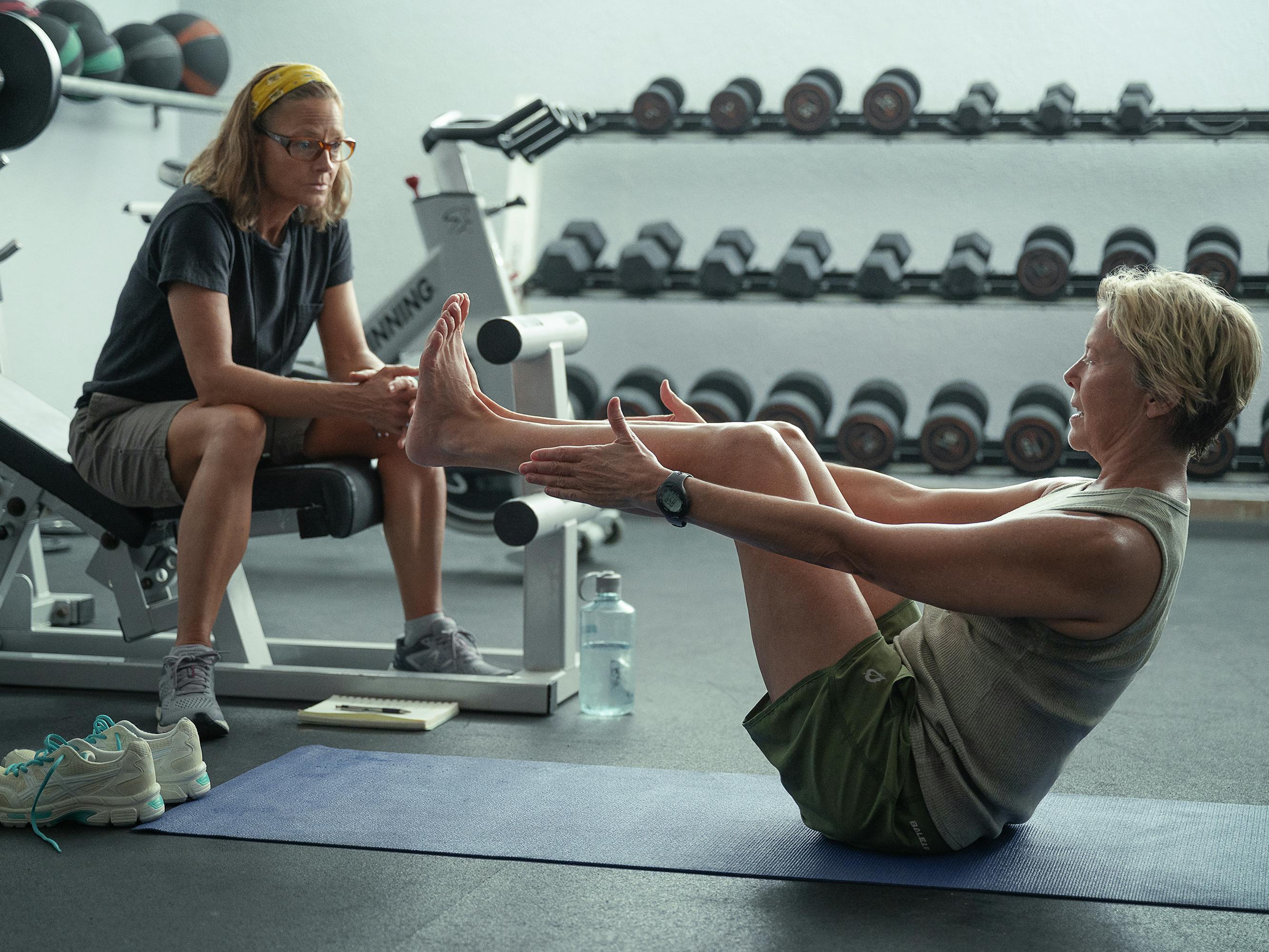
Bonnie Stoll (Jodie Foster) and Diana Nyad (Annette Bening)
Photograph by Kimberley French
AB: I don’t know. With The Grifters, I definitely needed to break out of something inside of myself from when I was young. I was raised in a pretty conservative household — definitely no sex before marriage and lying to my parents when I was in college [about] living with my boyfriend. It was that world. I don’t remember them ever sitting me down and giving me lectures about it, but you knew the rules. So, around that time, I’d been to Europe, I’d worked on [Valmont] for six months there, and I needed to grow up, basically. I needed to stop trying to please my parents. I got over it a little bit when I took my clothes off [in The Grifters]. My poor dad. He was, I think, traumatized by that. But at that point it was just, “Dad, I’m sorry. I love you very much, but I’m going to do what I want to do.” And [my parents] let go at that point.
JF: It’s funny that, isn’t it? When your parents see you in something and you’re like, “Oh.” But there is a lot of change and a lot of growth that comes through making movies, being with 175 people on a set, the relationships that you make, watching something from the beginning to the end and saying, “Why did this work? What are we trying to relate to people?”
AB: I didn’t start doing movies until I was almost 30. You were like four.
JF: I was three.
AB: So, yeah, I had been on the stage and I felt like a stage actress trying to be a movie actress for many years. I was used to speaking loudly, and I learned a lot of stupid things in acting school like, if you’re going to be in a movie, [the camera adds] 10 pounds. They always said that. I don’t know what that’s about, but that was one of the truisms. The other one was, you’re going to be too big. If you’re from the stage and you’re going to be in movies, your work is going to look too big. So I kind of stumbled my way in. It was very organic, though. I was in the theater and then I started auditioning for movies, and then I started getting parts. I didn’t know if that was going to happen.

Diana Nyad (Annette Bening)
Photograph by Kimberley French
JF: Is there a role that you’ve been dying to do that you haven’t gotten around to? My dream has always been to have somebody ask me to do something really hard that I have to spend a year doing. You did that on this, right? You spent a year swimming. I would like to have somebody say, “You need to speak Italian as if you’re Italian,” or, “You need to play the violin,” or, “You need to throw a javelin.”
AB: No, I don’t think so. I’ve been so fortunate because things have come along at the right time. When I think about aspirations, I think more in terms of my personal life. I’m 65. Luckily, there are still things out there for me to do. I just did a limited series, which I’d never done. I loved it. I thoroughly enjoyed the immersion in this story over this longer arc with this group of people that you become so close to, because that’s really the joy of the work, the company you keep.
JF: The industry of making movies: For me, it’s like a love affair that I’ve had my whole life. It’s a family. I like being on set with 170 people and grumbling about the coffee and having this sort of magical context where you all want something to be really good. I really felt that with this, that we were channeling Diana and Bonnie’s story and that it had so much meaning for them and potentially so much meaning for other people.
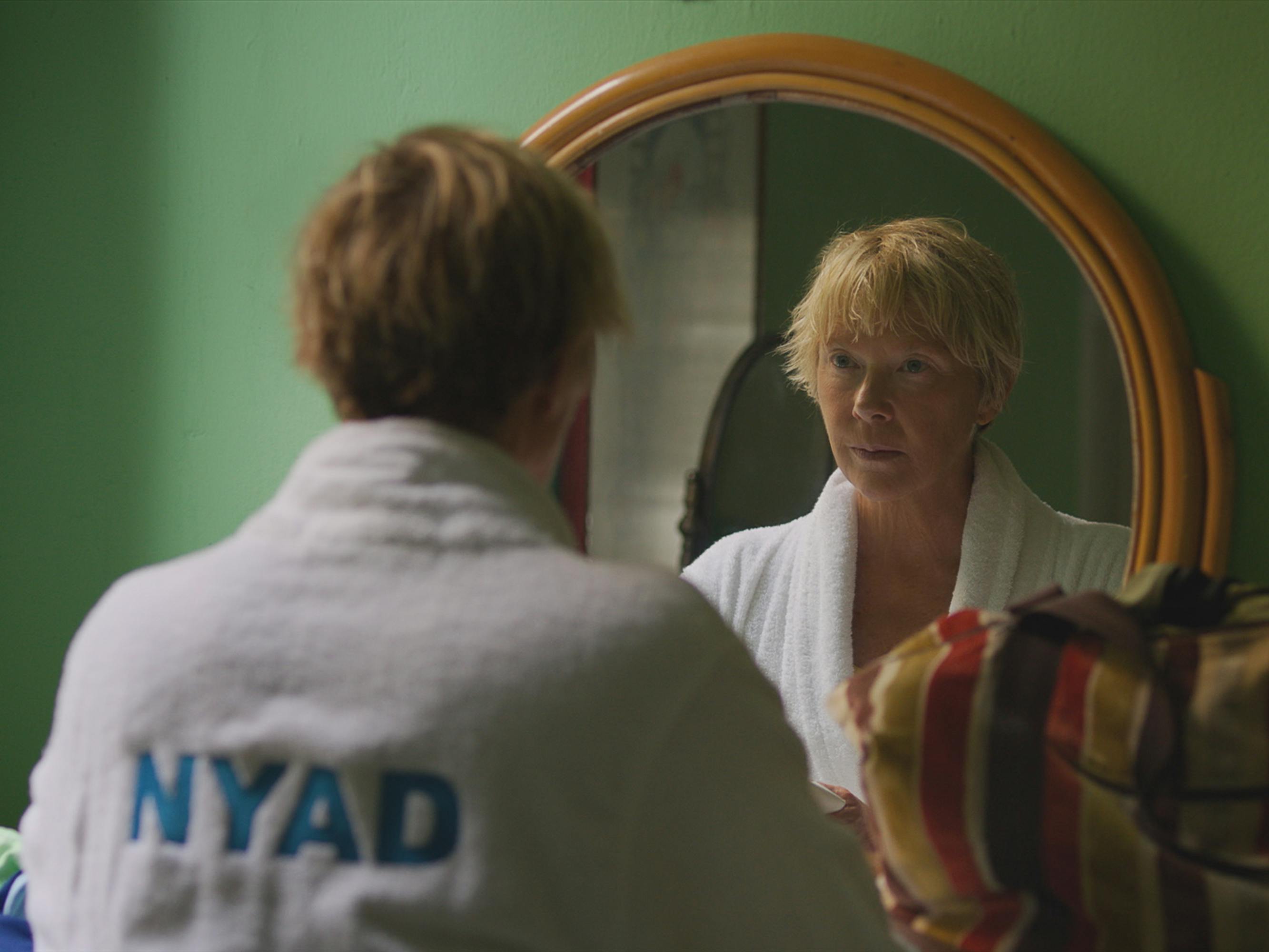
Diana Nyad (Annette Bening)
AB: For me, the real kick is how much people care, because talented people care. That’s what separates them, in my view. You just have to care with every ounce of your being. When there’s a whole bunch of people together that care 100 percent, then that’s interesting.
JF: Diana cared, and I think that’s really the strength of Diana’s story and your portrayal of her. I mean, she cared more than anybody on Earth.
AB: She cared so much that she drove everyone crazy. And it’s okay, Diana, your passion [addressing Nyad]. Thank God for it. When I read the script, I just was so inspired. You only get one free read, right? You only get one time when you’re the audience, and [then] you’re trying to recreate that experience for them when you make the movie, [that experience] of being on the edge of your seat and feeling changed. I think part of the reason I do what I do [is that] I love movies. I love going to the movies. I love watching stuff and being changed by it. And when something’s really good, you feel kind of changed. You feel different as a person.
